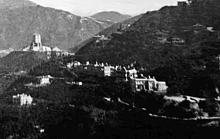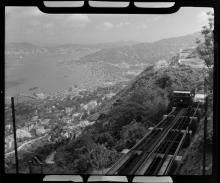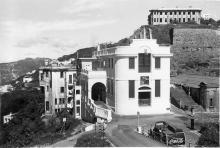Prof. Lawrence Lai from HKU writes about houses on the Peak after WW2*:
Meanwhile, the work of termites, looters hunting for valuables and firewood and the sub-tropical humid climate of Hong Kong ruined the European houses that survived the Battle of Hong Kong and the inaccuracy of the Allied bombings.
According to the Annual Report on Hong Kong for the Year 1946, the first post World War II annual report of the colonial administration, “tenement-type buildings for 160,000 persons and European-type housing for 7,000 persons had been destroyed or seriously damaged” (Government of Hong Kong 1947: 56).
The Peak District (Residence) Ordinance (Ordinance Number 8 of 1918) was issued to prevent that Chinese people live on the Peak. This didn’t mean the Chinese were not allowed to own houses, but to live there. This was valid until 1946 when the ordinances (as well the one for Cheng Chau) were repealed.
Prof. Lai made a survey on the ownership of houses on Barker Road. Interestingly, he found for RBL 91, which is 31 Barker Road, that the ownership was European from 1898 to 1945, and again from 1952. From 1946 to 1951, the owner was Chinese. He doesn’t give any names, but obviously the previous European owners (and probably residents) were not interested or able to rebuild the most likely looted house.
In an email, Prof. Lai wrote to me: “The Nationalist Chinese government also bought up a little land in the Peak. The British army commandeered some less damaged houses for a while as there was a great shortage of housing after the Japanese occupation.”
So the first Richmond House was demolished between 1946 and 1948, and an empty lot was left for some years. Later, the lot was sold to an European owner (Union Insurance Society of Canton Limited?) who built the second generation Richmond House in about 1952.
*Lai, LWC: “Discriminatory zoning in colonial Hong Kong: A review of the post-war literature and some further evidence for an economic theory of discrimination”, Property Management, 2011, v. 29 n. 1, p. 50-86


